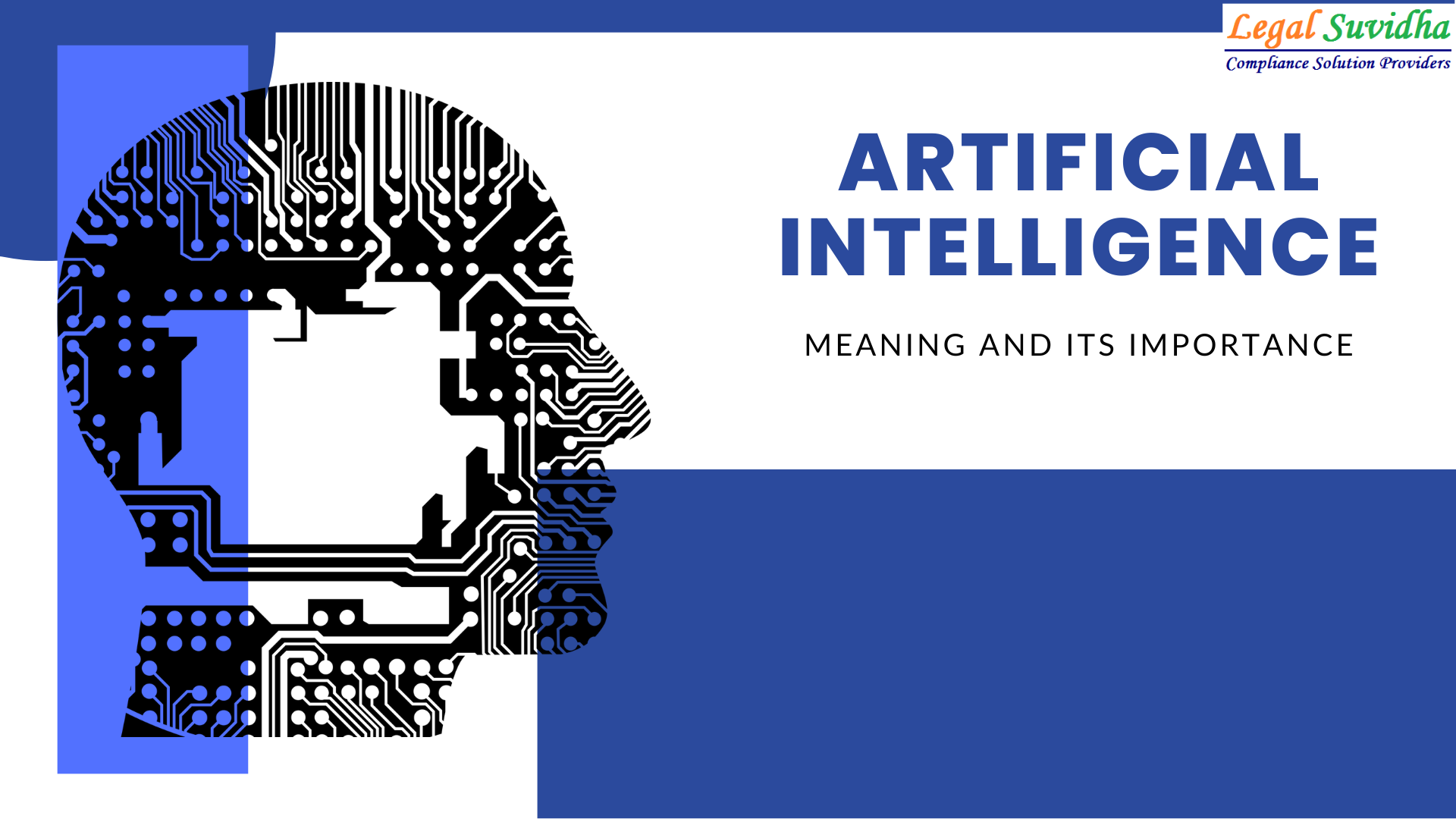ARTIFICIAL INTELLIGENCE AND ITS IMPORTANCE
INTRODUCTION:
Artificial Intelligence in simple terms means an ability of a computer or a robot controlled by a computer to do tasks that are usually done by humans because they require human intelligence and discernment. Creating a chat box, MCA helps and improves the ease of doing business, resolve the doubts and queries of the stakeholders in the compliance and will need less time and resources, allowing entrepreneurs to focus on their core operations.
A new “Business Model” to be introduced on the ministry’s compliance site will include chatbots to assist with filings, web forms rather than portable document format (PDF) forms, and artificial intelligence to guide the user through the filing process.
The new module will use artificial intelligence and data analytics to mine the information to spot trends in the corporate sector that may warrant the attention of regulators or policymakers, the new filing system will also influence the government’s administration of the regulatory framework under the Companies Act.
The ministry has already linked its technology platform with other departments such as Labour and employment and revenue, as well as some state governments and select banks, to provide a variety of services such as the issuance of Permanent Account Numbers (PAN), tax deduction and collection account numbers (TAN), Employees Provident Fund Organization (EPFO).
WHAT ARE THE USES OF ARTIFICIAL INTELLIGENCE?
1. Replacement of human arbitrator with AI-enabled system as an arbitrator
The whole Arbitral Tribunal can be replaced by an AI-enabled system. This will eliminate the process of selecting the Arbitrator by the parties or appointment of a sole arbitrator by the Court. Although the result in this process will be solely based on the algorithms used in the program of the system.
Hence, the power of deciding the case will be in the hands of the programmer. This would be the most controversial issue and there are chances of non-acceptance of the award as the right to choose the arbitrator will be removed
2. Combination of Human Arbitrators and AI-enabled system
Appointing Human Arbitrator along with an AI-enabled system can help in reaching to a conclusion much faster. AI can manage the analysed documents before the award is passed and answer the queries asked by the arbitrator while passing the final award. It can act as a tribunal secretary. But there can be some obstacles or disagreements,
for eg. the human arbitrator ignoring the logical answers provided by the AI-enabled system after analysing the evidences, which may result in a delay in the process discouraging the purpose of Arbitration.
Advantages:
1. Immediate Enforcement of Award
In the present scenario, after passing of award, the parties have to wait for the enforcement of the award. There is a gap between the pronouncement and enforcement of an appeal or application is not made for setting aside the award or for a stay on enforcement. AI will enable the immediate enforcement of an award.
For eg., In case of dispute in respect of money, award is passed that one party (A) will give a certain amount of money to another (B), then using AI, the amount is immediately transferred from A’s bank account to B’s bank account. AI can also send reminder at regular intervals to the concerned party and authorities for the enforcement of the award.
2. Elimination of Errors
Human Arbitrators can make errors in interpretation, translation, documentation, the appointment of authority, decision-making, etc. The use of AI at different stages or in different tasks can help in eliminating the inefficiencies in the arbitration proceedings. It can identify blind spots and recommend suggestions to alleviate such blind spots in order to make the process efficient. AI-infused products and services could assist in better management of cases by detecting inefficiencies and automating management tasks.
3. No influence of cognitive biases and unconsciousness
Humans are affected by cognitive biases. There can be instances that the arbitrator might be influenced by the cases he dealt with earlier on the same day or the external environment while deciding the case in the evening. Their approach in decision making can be affected. An example of cognitive biases is the anchor effect, where there is a common human tendency to rely on the first piece of information received to make subsequent decisions.
Humans have a tendency to such cognitive biases while approaching a decision. AI programs do not have an effect of the external environment and they do not suffer from cognitive biases.
Disadvantages:
1. Unemployment
The purpose of the development and use of AI is to reduce the human burden. But this has a direct impact on the employment rate as for making the AI system function, there will be a requirement of a few persons only. Moreover, AI will be competent to do the work done by humans resulting in a reduction of the workforce.
2. Data Privacy
Confidentiality is one of the fundamental necessities in the Arbitration Proceedings. AI is completely based on the intellectual algorithms and software programming developed by a programmer and selected few have full access to those algorithms which might provide the final decision in the particular case. Software programming is prone to hacking. There is a threat that the confidential information of the parties can be compromised through hacking. Any updating of the system also poses threat of virus and other complex technical issues
3. Non-acceptance of such system
Due to lack of reasoning, lack of transparency, a threat to confidentiality, and other such complications, the parties may not rely on the conclusion arrived at by the systems using the algorithms they will lose faith in the system.
There was a case in the US, commonly known as the ‘Loomis case’, where the conviction of Eric Loomis was based on the outcomes of the closed -source risk assessment software called COMPAS (Correctional Offender Management Profiling of Alternative Sanctions). The software uses proprietary algorithms that had 137- item Questionnaires which was developed by a Private Company called Equivalent. An appeal was made challenging the conviction based on secretive algorithms that cannot be examined. This shows the non-acceptance of AI in the legal field. There may be a threat that the programmers may not disclose the algorithms and how the system has reached at a particular conclusion. To completely rely on a non-human for adjudication is a tricky situation.
4. Lack of Flexibility
Every case in the arbitration is not the same, so if the decisions are made by system functioning of ratio and an organized method for deciding every case is same then it depicts the lack of flexibility. Every award is passed stating the reasons that helped in reaching the conclusion. If, there are just few fixed algorithms then there will be just few combinations of judgments, thereby a rigid structure will be devised









